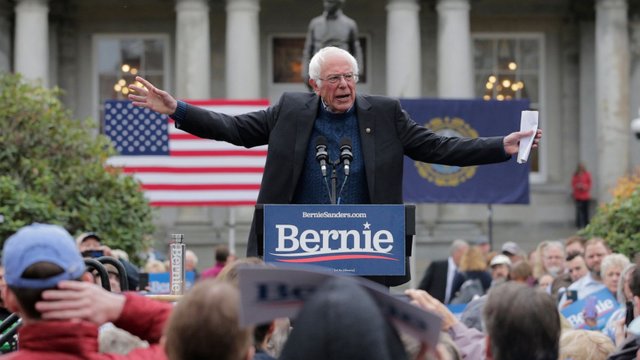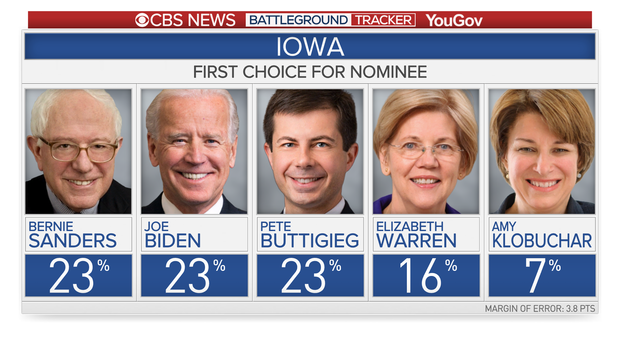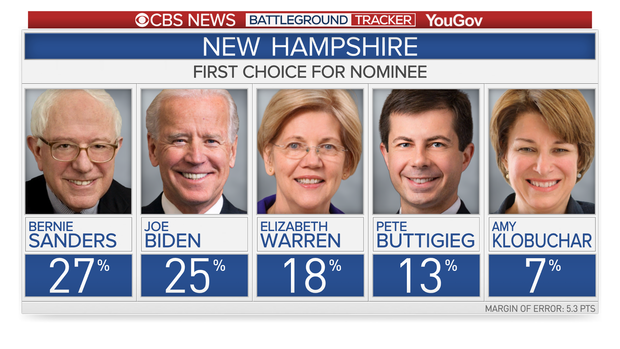CBS/YouGov: Bernie Sanders Tops New Hampshire With 3-Way Tie in Iowa

The Iowa caucuses are less than thirty days away now in early February followed by the New Hampshire primary days behind it, and Bernie Sanders seems to be riding high in both contests. Iowa is often unpredictable, and New Hampshire sometimes bucks the trend and ignores whatever Iowans decide to do. If you ask a New Hampshire voter, they'll tell you that "Iowa picks corn, New Hampshire picks presidents." Whatever the case may be, it's not unusual for the states to differ in outcome due to geographical advantages offered to certain candidates.
In the current snapshot, however, according to CBS News and YouGov, Sen. Bernie Sanders is leading New Hampshire and is tied with former vice president Joe Biden in the Hawkeye State:
The New Year opens with Bernie Sanders in his best standing yet against the field in Iowa and New Hampshire. He's in a first-place tie with Joe Biden and Pete Buttigieg in Iowa. All three are at 23%, and each would get a similar number of delegates out of the caucuses if they were to take place today, according to the CBS News Battleground Tracker. Sanders also now has a narrow edge in New Hampshire, with a two-point lead over Biden.Meanwhile, Elizabeth Warren has slipped in New Hampshire since November, as liberal voters have moved toward Sanders instead. However, she's still in position to get delegates there.

The bunched-up polls in Iowa indicate a very tight race and a very undecided electorate. Which candidate can best represent the Democratic Party and have the best shot at defeating President Trump? Those are the questions Iowa voters are asking themselves.
New Hampshire, on the other hand, is where Bernie's bread is buttered:

Sanders won New Hampshire in 2016 over Hillary Clinton since he hails from neighboring Vermont. He has a natural base of support and it appears Biden will be the only one giving him a serious challenge. Elizabeth Warren is a Senator from neighboring Massachusetts, and she plays well in New Hampshire, but she doesn't have the same connection Bernie does.
The neighboring state rule, however, doesn't always pan out. Sen. Amy Klobuchar of Minnesota shares a border with Iowa and continues to struggle in the state, though she is beating out other candidates which have eclipsed her nationally.
If Bernie wins Iowa, or comes very close, and then wins New Hampshire, he'll have to show well in Nevada on February 22 before Biden's South Carolina firewall comes up on February 29.
Meanwhile, with the focus shifting to early state polls, FiveThirtyEight provides analysis on how to use the national polls as a way to predict the primary outcome based on historical trends:
Using national polls conducted between July 1 and Dec. 31, 2019, we calculated a polling average for each Democratic candidate — including those who have dropped out — and then adjusted it based on how well-known a candidate was during that period of time. . .Based on analysis of 2019 national polls, Biden remains the most likely candidate to win the nomination with a 35% chance according to FiveThirtyEight. That's not a very high mark for a front runner which leaves the door open in these early states for another candidate to make a splash and shift the momentum quite easily. If much of Biden's allure is built-in name recognition, and a perceived ability to defeat President Trump, those traits could be chipped away quickly if he's stuck in tight primary or caucus battles and can't close the deal in some early states.Biden’s steady polling average over the year echoes what happened with three previous front-runners: Ronald Reagan in 1979, Bob Dole in 1995 and Al Gore in 1999, all of whom were leading the field in the second half of the calendar year before the election. All three had an unadjusted polling average of 30 percent or more in the first half of the year and were within 3 percentage points of their original number in the second half of the year (Reagan went from 34 to 37 percent; Dole, 46 to 44 percent; Gore, 54 to 55 percent). So the fact that Biden’s polling average has been pretty stable isn’t unprecedented — or even a bad sign. While only Reagan won the general election, all three went on to win their party’s nomination. . . .
But according to our analysis, someone polling around where Biden was in the second half of the year has roughly a 35 percent chance of claiming the Democratic nomination. A 1-in-3 chance isn’t great, but this is still better than, say, Bernie Sanders’s or Elizabeth Warren’s chances. They essentially tied for second, with an unadjusted polling average around 16 percent in the second half of the year, which historically has meant a 10 percent chance of winning.
If Biden lost in Iowa and New Hampshire, would his chances of winning the nomination go down? It's entirely possible that he could lose the early states, perhaps just picking up South Carolina, but still go on to win more states in March and eventually wrap up the nomination after some hard-fought months. For Bernie and others, though, the door is still wide open.
Add these new poll numbers up with Bernie's blowout fourth-quarter fundraising and you can see how he remains a strong contender.
Correction: The story has been updated to note that Sen. Amy Klobuchar hails from Minnesota, a state which borders Iowa.
Posted from Election Central : https://www.uspresidentialelectionnews.com/2020/01/cbs-yougov-bernie-sanders-tops-new-hampshire-with-3-way-tie-in-iowa/